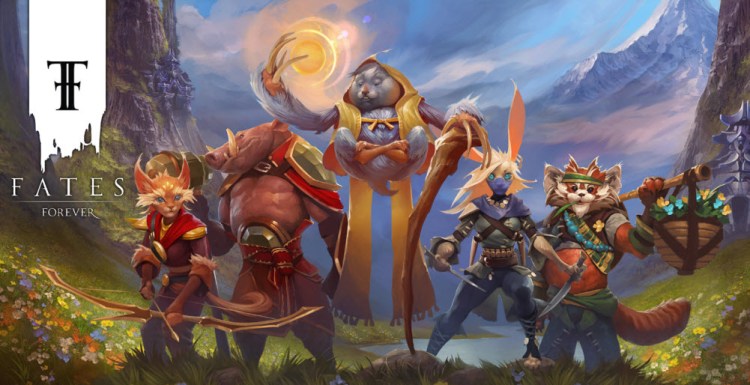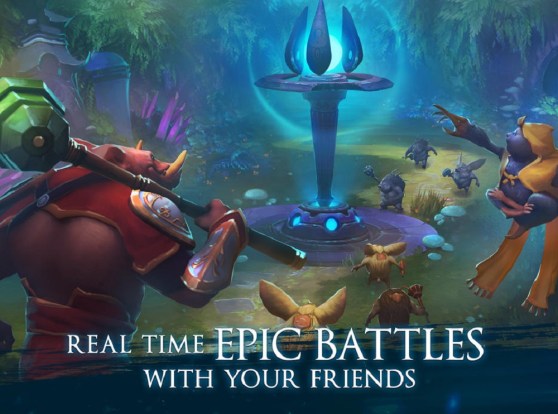GamesBeat: It would be very interesting to see it move into eSports. That seems to be one way games come to stick around for year.
Citron: Red Bull did an article this morning on eSports coming to tablets. The first game they listed was Hearthstone. The second one was World of Tanks Blitz. The third one was Fates Forever. I’ll take that.
Right now our players are already running their own tournaments. We haven’t done anything official, but we’re encouraging them. They’ve created guilds on our forums and run their own competitions. They’re doing everything themselves. That’s awesome. When we see our community doing things like that, we want to respond by making it easier for them to do it and supporting it through features in the app.
GamesBeat: I wonder if you could do things like live streaming from the tablet, as opposed to live streaming in front of a camera or what-have-you.
Citron: We’ve been working on something like that with the guys at Twitch.
GamesBeat: When new tablets come out, what sort of graphics upgrades are possible for you? Would you be able to improve the graphics in some way for more powerful tablets?
Citron: Sure. That’s always an option. Our approach is, we don’t really want to alienate people who are playing on iPad 2s, that level of device. They’re still very popular. Our goal is to make sure that iPads that people use support the game. As new iPads come out, depending on how the upgrade cycle plays out, we’ll add higher-end effects – I could see us adding realtime shadows and stuff like that, maybe improving our lighting – but the way these games work is that you want to have a lot of people playing them. Upgrading it can cut off lower-end devices, and if they still have a high usage rate, that’s not something we want to do.
League of Legends is now, what, seven or eight years old? The guys at Riot, they just recently announced that they’re upgrading all the graphics for their environments. They’ve decided to do that now because they feel like enough people have higher-end computers that they can upgrade their graphics and it won’t prevent anybody from playing the game.
GamesBeat: Do you at some point consider making something brand new, a new IP? Or do you think this will keep you busy for a while?
Citron: Our grand vision is to be more than just a single-game studio. We look at companies like Valve and Nintendo, or even Pixar, as far as the kind of company we want to be, the kind of reaction we want to create in our audience.
I expect that we’ll make multiple games. We might even do more than that, if you consider the background I have with OpenFeint and what that was like, although we have nothing to announce at this time. There’s a bigger opportunity to create a company that’s like those I mentioned, beyond just making games.
GamesBeat: Do you have any tips for people who might follow in your footsteps here? The things that you need to do and the things you need to avoid when making a tablet game.
Citron: The thing that gets most people making games is that there’s a lot of pressure to make something that looks a lot like what’s already popular. To some extent that’s what we did, too, but a lot of people make games that look like what’s popular on tablets specifically – Clash of Clans, Puzzle & Dragons. If you’re just copying something, not bringing something new, your chances of genuinely doing well are pretty slim.
A lot of that comes from your personal motivations as a developer. Being able to know when you have something that’s a lot of fun. Maybe that’s a long-winded way of saying that if you don’t think it’s fun yourself, it probably isn’t at all. Work on stuff that you’re passionate about, because it’s hard no matter what you do. If you don’t like what you’re doing, you’re not going to make it.
Sometimes I think I wouldn’t advise anyone to found a game company at all. When we started Hammer and Chisel two years ago, it wasn’t terribly smart, but it was still okay. I was able to pull it off because we could get the money together. But starting a game company today, especially on mobile, is very difficult. There’s so much congestion in the channel. It’s so hard to get your game out there. We were able to do it because we could get a team of people together who could deliver a whole different level of quality. If you’re not going to make something that stands out like that, it’s going to be really hard.
GamesBeat: You funded some of this with your own money, and then you raised some money. How do you feel about that as a way of paying for things?
Citron: It was the best way for me, which was why I did it. But I don’t necessarily know that it’s the best way for everyone. I raised money because I wanted to get smart people to be my mentors. I wanted to be able to ask them questions when I needed help. Building a company is hard. Any time you can convince people who are smarter than you to be on your team, it’s worth it.
I put some of my own money in just because I could. It made people take us more seriously. I had some skin in the game. If you’re in a position to do that, investors will take you more seriously. But there are many different paths. It depends on the entrepreneur.
GamesBeat: You must have enjoyed getting your hands dirty making a game again.
Citron: Yeah, it’s been a lot of fun. When I started Aurora Feint, I wanted to build the kinds of games I wanted to play on iPhone. At the time, with the resources that we had, that was a version of Tetris Attack, which was one of my favorite games on the Super Nintendo. But I always wanted to build a gaming company. OpenFeint was a fantastic experience, but getting to actually do that with Hammer and Chisel and Fates Forever has been a ton of fun.
GamesBeat: I saw the Wall Street Journal about Machine Zone raising money, with their valuation targeted at $3 billion. That’s an eye-opener.
Citron: Yeah. It’s crazy. We’re headed back to a level—What’s perhaps not intuitive is that the gaming industry has gotten so big now. So many people play video games that don’t call themselves gamers. You can have companies doing that kind of stuff with one product, because there are so many people who can play it. With the economics of free-to-play, you get elastic demand. People who want to spend money will spend money, people who don’t want to won’t, and it still works.
It’s an amazing time to engage in video games. It’s just really competitive. So many amazing indie games are coming out, so many amazing game companies are becoming successful, and they’re doing it with so many different kinds of games. I just downloaded Transistor on my PS4. I’m really excited for it, because I loved Bastion. That’s one kind of game. Then you have Game of War and Machine Zone, which is something totally different. You have League of Legends, World of Tanks, Clash of Clans, the Kim Kardashian thing, and so many other different markets of gamers. All together, it’s just so big now.
VentureBeat's mission is to be a digital town square for technical decision-makers to gain knowledge about transformative enterprise technology and transact. Learn More



